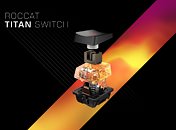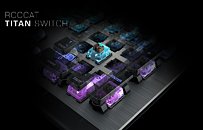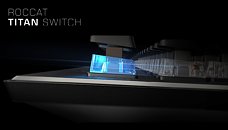Thursday, May 31st 2018

ROCCAT Announces Its First In-House-Developed Switch, the Titan
ROCCAT presents the Titan Switch Tactile, the first mechanical switch designed in-house in cooperation with TTC, a leading manufacturer in its field. The Titan Switch Tactile is the perfect synthesis of competitive speed, first-class typing feel and striking aesthetics.
ROCCAT's challenge was to make a more responsive and swift switch. The first step was to reduce the actuation point from 2 to 1.8 mm, keeping in focus the quality feel of the key stroke. In addition, the switch bouncing time was reduced by 20%, this was achieved by optimizing the ROCCAT firmware working in conjunction with high-quality components, therefore securing the stability of the switch.The crisp, tactile pressure point paired with solid precision and high reaction speed ensures an excellent typing feel. To top it all off, design also played a decisive role in the development of the Titan Switch Tactile, a world premiere in this area. The transparent housing in combination with reduced, ultra-light key caps not only allow insights into the mechanics of the switch, but also becomes the perfect companion for the ROCCAT AIMO lighting system.
Each switch contains a long-life multicolor LED for impressive lighting scenarios in a range of 16.8 million colors. The result is a powerfully balanced switch - precise, responsive, and comfortable.
ROCCAT's challenge was to make a more responsive and swift switch. The first step was to reduce the actuation point from 2 to 1.8 mm, keeping in focus the quality feel of the key stroke. In addition, the switch bouncing time was reduced by 20%, this was achieved by optimizing the ROCCAT firmware working in conjunction with high-quality components, therefore securing the stability of the switch.The crisp, tactile pressure point paired with solid precision and high reaction speed ensures an excellent typing feel. To top it all off, design also played a decisive role in the development of the Titan Switch Tactile, a world premiere in this area. The transparent housing in combination with reduced, ultra-light key caps not only allow insights into the mechanics of the switch, but also becomes the perfect companion for the ROCCAT AIMO lighting system.
Each switch contains a long-life multicolor LED for impressive lighting scenarios in a range of 16.8 million colors. The result is a powerfully balanced switch - precise, responsive, and comfortable.



12 Comments on ROCCAT Announces Its First In-House-Developed Switch, the Titan
Honestly do not understand why a switch would be 'Titan'. Maybe I'm weird
Just give me lower (not low though) profile Cherry switches already and I'll be happy.
And its all fine. We all have hobbies and they cost some money. But I think its healthy to get the above perspective thrown at you from time to time. (I notice the positive effect of that with myself, at least)
But yes, it's very much a hobby (and an expensive one at that) and not something that most people really care very much about... but it's not nonsense, it's just a question as to whether someone is really bothered or not. You will find most people are really quite surprised once they start exploring this rabbit hole though... it goes a looooooong way down! ;)
Its personal preference. And if you personally prefer to lube your switches... power to you. But realistically? Its a little bit odd and certainly miles away from necessity in any way shape or form. Similar to the type of switch and all that other jazz. Its a personal preference and we only prefer it because we can afford it. Not because it is needed in any way for any noticeable gain in productivity or ergonomics. Just comfort. Its abstract, not measurable.
Don't get me wrong, I have a mechanical keyboard myself, but I'm sane enough to know its just a preference, and that is all it is. My gaming even competitively hasn't improved coming from membrane switches, its not 'faster' in any perceivable way or even more reliable in terms of repeated, fast key presses; and my typing is in fact faster on a membrane or scissor switch...
There's two things going on here... on one side we have the industry and keyboard manufacturers pushing various switches etc. There's going to be all sorts of inflated claims around as to why their switch is better etc. and yes, that's mostly marketing fluff which should be largely ignored. On the other hand, the myriad options available do NOT all feel the same, not at all. Yes that's predominantly a comfort issue, but for someone who is behind a keyboard most of the day, that's a HUGE factor in their decision making. The only way you can know what's right for you is to experiment. It would be far more than a 5% difference if you're typing on a keyboard that gives you finger pain (as I have experienced with some switches) vs one that you can type on all day with none!
But as you go down the keyboard switch rabbit hole, this is NOT the case. There is simply no comparison to audio cables. I would put money on the ability to fool plenty of 'experts' with a cheap off the shelf cable posing as a top end one. You can't do that with a keyboard switch. There is no getting away from the difference in actuation force, the feel of the stem (with and without lube) and the weight of the spring, even keycap shape and material plays a role. My 92-year old grandma could tell the difference. It doesn't matter if she has any interest or need for a mechanical keyboard switch in her life... that wasn't my original point. I was merely stating that there IS a perceivable and sometimes very obvious difference between all manner of keyboard switches. This aspect isn't psychological, it's the human sense of TOUCH, which as stated, has been proven to be incredibly sensitive. So much so in fact, that scientists have shown our touch is sensitive enough to feel the difference between surfaces that differ by just a single layer of molecules.
As to there being no advantage... well, to whom and in what context? For the average person who sends few emails and browses Amazon daily then no, obviously not. To a pro-gamer where every millisecond counts, then very much yes, there would be a significant advantage using fast actuation switches over slow. And my example of using a heavy switch vs a light one for someone who does a lot of typing every day is another situation where that light switch would quite clearly offer a greater advantage. You can't 'measure' this in a traditional sense (I don't know what you mean by that term exactly here), but the advantages are very obvious in specific situations. The bottom line is that if you spend A LOT of time behind a keyboard, switch choice becomes a very significant factor in what you're doing, for better or worse.
You are correct that people develop a preference, but this is true of everything in life. You can't know what you prefer until you've spent time doing it and experienced the various options available to you. Of course, some people just don't care and never will, but that's fine. It doesn't mean the entire mech switch industry is snake-oil, it just means you have to navigate the often inflated and sometimes bogus claims of manufacturers to find what works best for you.